Coping with Adjustment Disorder as Chiense Migrants in Melbourne
Migrating to a new country is an exciting adventure, but it can also be incredibly challenging. For many Chinese Australians, the initial thrill of a new life can fade, replaced by a sense of loss, isolation, and confusion. This is completely normal and might be a sign of adjustment disorder.
The Li Family’s Story
Take the Li family for instance. Mark LI arrived in Melbourne in late 2023 with his wife Lily, and their two young children, Michelle (12) and Thomas (8). and Mark’s mother Leslie (68).
Mark had secured a good job as an engineer, and Michelle and Thomas were eager to start at a new school.Lily was a music teacher back home and she planned to look for a job at schools once the family settles. Initially, everyone was excited about the new adventure. However, after a few months, the excitement began to wear off.
Mark struggled with the unfamiliar work environment and the Australian work culture. Communication was a challenge, and he often felt like an outsider. Lily’s job hunting was faced with multiple barriers including additional teaching certificates and differences in course structure, which means she had to jump through more hoops before she is eligible for a job in a school. Michelle and Thomas found it difficult to adjust to school, missing their old friends and classmates. Grandma Leslie spent time supporting the family, but she finds herself feeling trapped in the family home, unable to speak English and leave home on her own, and she misses the familiar routines of her life in China. Leslie felt especially isolated.
As weeks turned into months, the Li family started experiencing symptoms of adjustment disorder. Lily grappled with feelings of frustration and a loss of purpose. Mark became withdrawn and irritable. Michelle’s grades slipped, and Thomas started having trouble sleeping. Leslie felt increasingly lonely and homesick.
Understanding Adjustment Disorder:
Adjustment disorder is a temporary mental health condition that arises when someone struggles to adapt to a major life change, like migration. It’s common for migrants to experience symptoms like:
- Sadness and low mood
- Anxiety and worry
- Feelings of isolation and loneliness
- Difficulty sleeping or changes in appetite
- Anger or irritability
- Homesickness
- Difficulty adjusting to cultural differences
Challenges Faced by Chinese Australians:
Chinese Australians face unique challenges during migration. Cultural differences in communication styles, social norms, and expectations can be significant. Language barriers can make everyday tasks more difficult, and finding a sense of belonging within the Australian community can be a struggle.
Coping with Adjustment Disorder
Here are some tips to help you cope with adjustment disorder as a Chinese Australian:
- Acknowledge Your Feelings: It’s important to validate your emotions. Feeling lost, lonely, or frustrated after migration is perfectly normal.
- Connect with Your Community: Seek out other Chinese Australians in Melbourne. There are many social groups and community centres that can provide support and connection, such as CCSSCI.
- Embrace the Journey: Focus on the positive aspects of your migration experience. Celebrate your achievements, no matter how small.
- Maintain Your Culture: Don’t be afraid to hold onto your Chinese traditions and values. This can provide a sense of comfort and stability during this transition.
- Learn About Australian Culture: The more you understand Australian customs and social norms, the easier it will be to adjust. A good starting point can be found on Tourism Australia, and more importantly is to allow yourself to stay curious and continue to engage with the locals.
- Seek Professional Help: If you’re struggling to cope, don’t hesitate to seek professional support. A counsellor who specialises in working with migrants and multicultural communities can provide valuable guidance and support. Consider reaching out to Ashore Wellness to get started with counselling from a therapist who understands Chinese culture and is able to support you through difficult times.
What do we offer to support migrants like Li’s family?
As a narrative therapist, Nick at Ashore Wellness can help the Li family explore their migration experience and rewrite the narrative of feeling lost. Using their strength to support themselves to adapt to the big changes in their life and face their challenges with positive mindsets. Narrative therapy allows them to:
- Externalise the Problem: Separate themselves from the challenges of adjustment disorder.
- Identify Their Strengths: Recognize the skills and resources they brought with them from China.
- Develop a Preferred Story: Craft a new story about their life in Australia, one filled with hope and possibility.
Remember, you are not alone. Many Chinese Australians, like the Li family, have successfully navigated the challenges of migration. With the right support and resources, you can too.
If you’re feeling lost after migrating to Australia, please reach out. Ashore Wellness offers both in-person sessions in Footscray (inner west of Melbourne, 6 km from CBD) and online counselling services for people across Australia. Let’s work together to help you adjust to your new life and build a fulfilling future in Australia.





